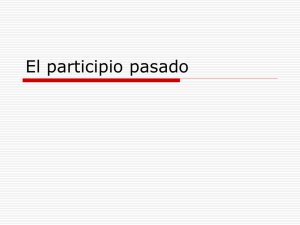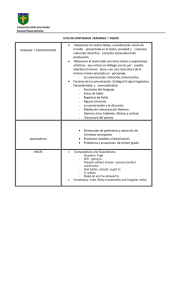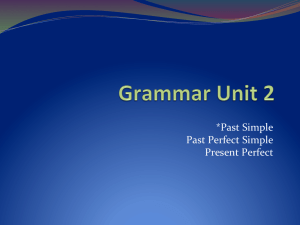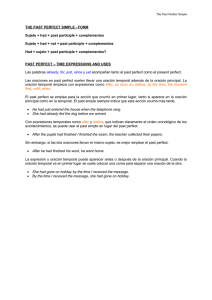• El "present perfect" es un tiempo que sirve para describir acciones
Anuncio
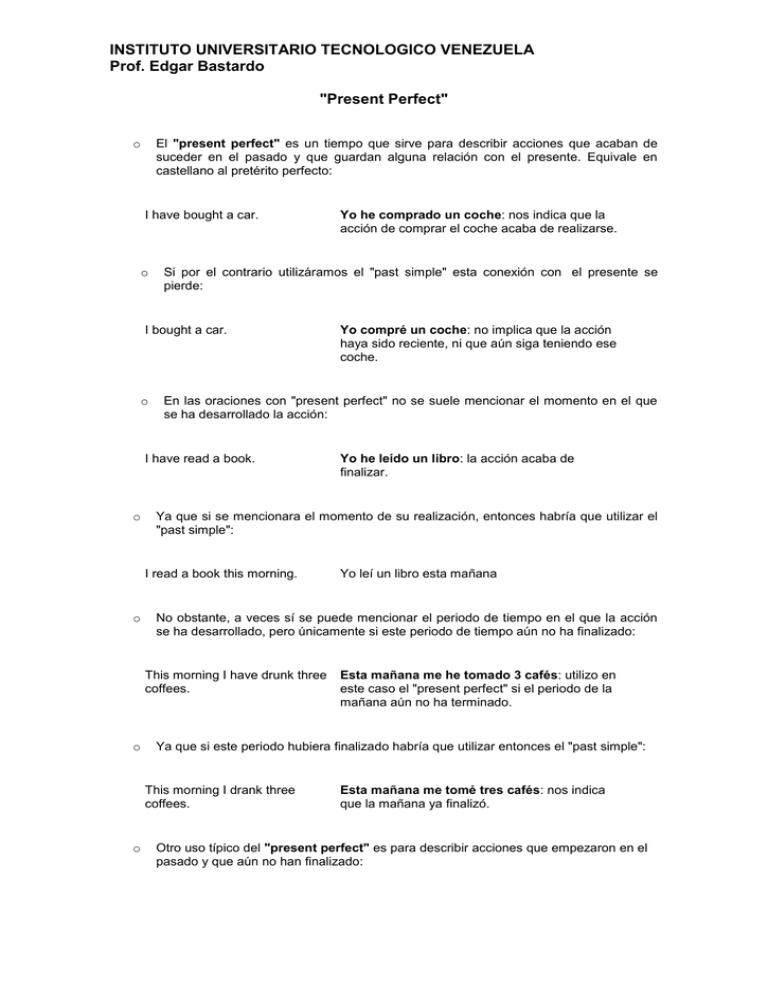
INSTITUTO UNIVERSITARIO TECNOLOGICO VENEZUELA Prof. Edgar Bastardo "Present Perfect" o El "present perfect" es un tiempo que sirve para describir acciones que acaban de suceder en el pasado y que guardan alguna relación con el presente. Equivale en castellano al pretérito perfecto: I have bought a car. o Si por el contrario utilizáramos el "past simple" esta conexión con el presente se pierde: I bought a car. o Esta mañana me he tomado 3 cafés: utilizo en este caso el "present perfect" si el periodo de la mañana aún no ha terminado. Ya que si este periodo hubiera finalizado habría que utilizar entonces el "past simple": This morning I drank three coffees. o Yo leí un libro esta mañana No obstante, a veces sí se puede mencionar el periodo de tiempo en el que la acción se ha desarrollado, pero únicamente si este periodo de tiempo aún no ha finalizado: This morning I have drunk three coffees. o Yo he leído un libro: la acción acaba de finalizar. Ya que si se mencionara el momento de su realización, entonces habría que utilizar el "past simple": I read a book this morning. o Yo compré un coche: no implica que la acción haya sido reciente, ni que aún siga teniendo ese coche. En las oraciones con "present perfect" no se suele mencionar el momento en el que se ha desarrollado la acción: I have read a book. o Yo he comprado un coche: nos indica que la acción de comprar el coche acaba de realizarse. Esta mañana me tomé tres cafés: nos indica que la mañana ya finalizó. Otro uso típico del "present perfect" es para describir acciones que empezaron en el pasado y que aún no han finalizado: INSTITUTO UNIVERSITARIO TECNOLOGICO VENEZUELA Prof. Edgar Bastardo He vivido en esta ciudad desde 1980: implica que sigo viviendo en la ciudad. I have played tennis since my childhood. He jugado al tenis desde mi infancia: y sigo jugando I have lived in this city since 1980. o Si la acción hubiera ya finalizado entonces habría que utilizar el "past simple": I lived in this city for 10 years. I played tennis for many years. o El "present perfect" se forma con el auxiliar "to have" en presente del indicativo (simple present), más el participio (past participle) del verbo principal: I have listened to the news. She has watched TV. o Yo viví en esta ciudad 10 años: pero ya no vivo ahí. Yo jugué al tenis muchos años: pero ya no juego. Yo he escuchado las noticias Ella ha visto la tele La forma negativa se forma con la partícula de negación "not" entre el auxiliar y el verbo principal, y la forma interrogativa se construye con el auxiliar al comienzo de la oración, seguido del sujeto y del verbo principal: I have not done my homework. Have you been in Seville? Yo no he hecho mis deberes. ¿ Has estado en Sevilla ? INSTITUTO UNIVERSITARIO TECNOLOGICO VENEZUELA Prof. Edgar Bastardo “El Pasado Perfecto” Se usa el pasado perfecto en inglés (past perfect) para hablar de una acción que ocurrió antes de otra acción, las dos siendo en el pasado. Se usa para mostrar el orden del las acciones del pasado. Example When I arrived at the bus stop the bus had already left. Cuando llegué a la parada del autobús el autobús ya se había ido. 1st action - the bus left 2nd action - I arrived at the bus stop Fórmula: 1. Afirmativos y Negativos Subject + had/hadn´t + past participle (haga click aquí para una lista de los participios de verbos irregulares) Tips (tips = consejos) Sigue las mismas reglas para verbos regulares que las del pasado simple: If the verb has one syllable and finishes with one vowel followed by one consonant you need to double the consonant Example: stop –> stopped If the verb finishes in ‘y’ you need to take away the ‘y’ and add ‘ied’ Example: study –> studied For all other regular verbs just add 'ed' 2. Preguntas: Question word + had + subject + past participle Where had you been? (¿Dónde habías estado?) or INSTITUTO UNIVERSITARIO TECNOLOGICO VENEZUELA Prof. Edgar Bastardo Had + subject + past participle Had he seen it before? (¿lo habías visto antes?) Tips (consejos) Cuando se usa la palabra already (ya) con este tiempo se pone entre had y el past participle Example When I got there the party had already started. Cuando llegué la fiesta ya habia empezado 1st acción: the party started – 2nd acción: I got there By the time significa cuando en español Antes de usar el pasado perfecto preguntarse si una acción había ocurrido antes de la otra acción Ejercicio: Put the verbs in the correct form – past simple or past perfect. Soluciones aquí. 1 By the time……………………….(stop) raining the whole village…………………… (be) flooded. 2 I eventually ………….(find) my keys which I …………..(leave) on the table in the living room. 3 After I …………….(speak) to the doctor I ………..(feel) much better. 4 I ……….(study) a lot the day before I …………(took) my English 1st Certificate exam. 5 I …………...(finish) tidying up by the time my parents………..(arrive). 6 He…………(was) sure he ………..(see) her somewhere before 7 We……………(was) afraid because we…………….horse riding before. 8 When I……..(spend) a year travelling I…....... (already/complete) my degree at university. INSTITUTO UNIVERSITARIO TECNOLOGICO VENEZUELA Prof. Edgar Bastardo 9 I …………..(eat) such a large breakfast that I only ………….(had) a small lunch . 10 After I ………..(make) all the necessary changes to the article I ……..(send) it to the publishers. INSTITUTO UNIVERSITARIO TECNOLOGICO VENEZUELA Prof. Edgar Bastardo “Future Perfect” o Se utiliza el "future perfect" para describir acciones que se están ya desarrollando o que se van a desarrollar en el futuro, pero que, en cualquier caso, cuando llegue ese momento futuro al que nos estamos refiriendo la acción ya habrá finalizado. Esta forma se suele utilizar con una expresión temporal: By this evening I will have done my homework. Antes de esta tarde, yo habré hecho mis deberes (puede que ya los esté haciendo o que aún no los haya comenzado. Pero, en todo caso, cuando llegue la tarde los deberes estarán terminados). Before summer you will have sold your house. Antes del verano, tú habrás vendido tu casa (todavía no es verano, pero cuando lo sea la casa estará vendida) o Este tiempo se forma con el futuro simple del verbo auxiliar "to have", más el participio (past participle) del verbo principal: By 6 o'clock I wiIl have cleaned my car. Antes de las seis, yo habré limpiado mi coche Before we arrive, she will have cooked the supper. Antes de que lleguemos, ella habrá preparado la cena o La forma negativa se forma interponiendo la negación "not" entre el auxiliar y el verbo principal (atención a su colocación entre los dos componentes del verbo auxiliar: "will" y "have") : I wiIl not have finished my homework by 7 o'clock. Antes de las siete, yo no habré finalizado mis deberes Before you arrive, we will not have watered the garden. Antes de que llegues, nosotros no habremos regado el jardín o La forma interrogativa se construye comenzando con "will", seguido del sujeto, de la forma infinitiva "have" y del verbo principal: Will you have bought a new car before ¿ Te habrás comprado un coche summer? nuevo antes del verano? Will she have learned Spanish before leaving? ¿ Habrá aprendido ella español antes de marcharse ? INSTITUTO UNIVERSITARIO TECNOLOGICO VENEZUELA Prof. Edgar Bastardo o Si la interrogación es negativa, la partícula "not" se coloca entre el sujeto y la forma infinitiva "have", aunque también se podría utilizar la contracción "won't" (= will not) que iría al comienzo de la oración: Won´t you have eaten the dinner by 10 ¿ Antes de las 10, no te habrás o'clock? tomado la cena ? Won't you have eaten the dinner by 10 o'clock?
